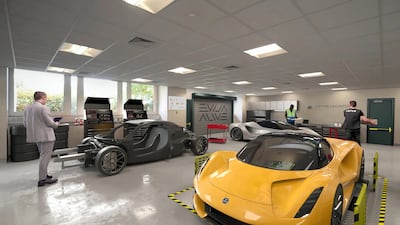British-born sports car brand Lotus is about to reinvent itself as a mainstream sports and luxury car manufacturer. It aims to take on giants such as Ferrari, Bentley and Porsche with a 10 to 20-fold production increase as a Dh10 billion ($2.7bn) investment from its joint owners, China's Zhejiang Geely Holding Group and Malaysia's Etika Automotive, comes to fruition.
With the new investment, the former Formula One Constructors are set to become a leading manufacturer of electric vehicles with luxury cars and SUVs being manufactured in China while its more traditional sports cars will continue to be made at its founding factory in Hethel, UK.
"This year is a pivotal one for Lotus, particularly with our sports cars, because we reach the end of one era and begin another," says Matt Windle, the managing director of Lotus Cars.
“The spirit and passion that gave the world models like the Elise, Exige and Evora will live on in the next generation of cars such as the all-new Lotus Emira.”
Four new engineering platforms will provide the cornerstone to the Lotus renaissance, which will cover sportscars, hypercars, premium cars and electric sportscars, as part of a 10-year plan established by Geely, which holds the controlling stake after it took over the marque from Proton in 2017.
Lotus will bid farewell to its signature models – Elise, Exige and Evora – to make way for a fully electric line-up, but before it consigns petrol engines to the history books, it’s giving the combustion engine one final fling in the form of a new sports car being launched at the Goodwood Festival of Speed on Thursday, July 8.
While full details of Emira are still under wraps, it’s expected to include the choice of a two-litre, turbocharged four-cylinder engine, as well as the current supercharged V6 from the Evora, though one thing we can confirm is that it won’t be hybrid.
Beyond that, the Evija will be the company's first fully electric "hypercar". It recently toured the UAE and will be launched later in 2021. Debuting the company's Hypercar Architecture, it should develop just under 2,000 brake horsepower and 1700Nm of torque with a top speed of 345 kilometres per hour, but will be limited to 130 units at a price of about Dh2 million.
“Our development progress is 80 per cent there in terms of power, batteries, motors and body,” explains Gavan Kershaw, director of product attributes, and Lotus’s chief test driver. “The remaining 20 per cent is to make everything work in harmony and deliver the driving experience that we expect.
“Evija is an absolutely phenomenal drive. It has F1 acceleration but in a closed cockpit, so it’s like a little LeMans-style racer but with the torque and instant delivery of an electric motor. You start to believe you can defy physics because it fires you around corners like a catapult.”
Formed in 1952 by Colin Chapman as a means to fund his motor racing business, Lotus Cars has always been a niche manufacturer operating out of its original building in Hethel. It’s maintained a solid following of enthusiasts who buy their cars more as track-day toys and for club-level racing rather than for daily use.
But Geely is about to change that image, starting with Dh500m poured into overhauling its UK facilities and adding key strategic global locations with several sites in China, as well as offices in Sweden, Germany, Michigan and Los Angeles for marketing, design, administration, manufacturing and engineering, plus another UK location on the Wellesbourne campus at the University of Warwick.
While the image of Lotus depends on these sports cars, which will remain a key marketing tool for the brand, the revenue comes from volume and this is where its third platform for Premium Architecture comes in. This evolution platform will be the basis for an all-new range of lifestyle vehicles, including the much-rumoured SUVs that are said to develop as much as 750bhp and offer 580km of range. The architecture has been defined and designed in the UK, but supported by collaborative work with teams in China, Sweden and Germany, and will be manufactured in Wuhan, China.
The final piece of the jigsaw is its Electric Sportscar Architecture that will be available for other manufacturers to use for their own models as a way to fast track their own EV sportscar development.
Lotus and the Renault Group's Alpine brand announced a partnership with this E-Sports platform in January to jointly develop a new vehicle under the Alpine brand.
“The E-Sports architecture will be modular and generate a new sportscar icon for Lotus, with contemporary styling and strong performance and I have challenged our teams to target the same weight as our latest combustion engine sports cars,” Windle says.
With this also comes a new look in showrooms that will take on a more modern retail identity, with the world's first location scheduled to open in Bahrain in June.
Geoff Dowding, executive director, sales and aftersales, says: “Launching an all-new visual identity for our retail partners is hugely exciting in our transformation because we will offer a combination of online and offline retail experiences that will be accessible 24 hours a day.”
Distributed through Adamas Motors in the Middle East, the region has gained popularity with Lotus and Geely following the recent opening of its new double-storey Dubai showroom, the world’s largest dedicated to the marque to date on Sheikh Zayed Road.
Lotus currently produces about 1,600 cars annually, but that is expected to grow into the “tens of thousands”, according to Windle, once its international operations come online with Emira alone expected to triple the company’s volume.
















